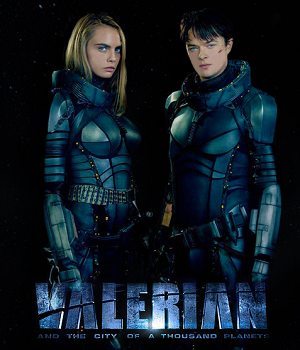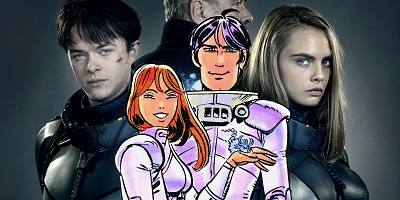
During the seven centuries between our age and Valerian’s, the International Space Station has been cut loose from Earth orbit after growing to the size of a small moon. Now known as Alpha, “The City of a Thousand Planets”, it drifts through space, an intergalactic hub for humanity and its hundreds of alien neighbors, protected by its space agents. Two of these, Valerian and Laureline, chase down stolen property, the converter of Mül, a creature that is a living replicator. Plagued by visions of a strange world, Valerian asks Laureline to marry him prior to the mission. She refuses, for the time being. After the converter is rescued, the team return to Alpha, where they must investigate a strange irradiated zone at the heart of the space station. After strange aliens matching those from Valerian’s dreams attack the station’s command staff, Valerian pursues them into the dead zone, disappearing from sensors. Worried, Laureline tries to save Valerian from the radiation before it is too late, only to discover a web of secrets and lies at the heart of the station.
Loosely inspired by the Ambassador of the Shadows volume of the Valerian and Laureline comic (reviewed here), Valerian and the City of a Thousand Planets is a colorful adventure through a brilliant backdrop undertaken by drab characters. Visually, the movie captures the biotechnology drawn by comic artist Jean-Claude Mézières and even reproduces several panels outright from Ambassador of the Shadows. This creates an appealing future for Valerian and Laureline to explore. Unfortunately, most of the movie’s faults–from poor casting to its long run time–all stem from the same source: director and screenwriter Luc Besson does not understand the characters in Valerian and Laureline.
This is obvious from the first scenes with Laureline. No longer is she a medieval free spirit who was saved by Valerian on an earlier adventure in time. Now, she’s a good Harvard girl, and a real ball-buster who delights in belittling Valerian. Instantly, three major aspects of Laureline’s character are destroyed. First, Laureline in the comics is head-over-heels in love with Valerian, and essentially acts as his common-law wife. Her position at his side is assured, despite the hundreds of hearts he’s broken before he met her. Second, the source of conflict between Laureline and Valerian is obscured. Comics Laureline often grows frustrated with Valerian out of a difference of approach. Valerian is a typical hero motivated by duty who takes the direct and usually violent approach to solving problems, while Laureline relies on her charm and wit to find a more pragmatic solution. This tension between contrasting opinions fuels the couple’s fights, not movie Laureline’s jealousy and pettiness. Third, Laureline is cast as the wrong type of feminist. Valerian and Laureline is an unashamedly feminist work, but it’s of an earlier kind that emphasizes the contrast between male and female instead of the obliteration of sex roles seen in current strains of feminism. In the comics, Laureline’s kinder, mostly gentler means of negotiation and charm are repeatedly shown to be more successful than Valerian’s straight-forward march-into-the-abattoir methods of violence. Yet not-Laureline in the movie is the typical surly over-educated action girl, browbeating everyone when she isn’t kicking them. The alien stool pigeon shingouz adore Laureline in the comics. Not-Laureline practically abuses them into submission. In fact, as Pixie-fu Action Girl #238, not-Laureline’s methods are more masculine than even Valerian’s in the comics.
So the dynamics in the movie are confused. So much time is spent setting up Laureline as an equal to Valerian on the battlefield that she never shows her strengths in persuasion. Valerian’s duty is only set against Laureline’s practicality once–at the climax. What should have been the central theme of Valerian and Laureline becomes unearned melodrama at odds with the previous portrayal of the characters. The homogenizing of Valerian and Laureline undercuts the tension between the characters, weakening both Valerian and any believable romance between them. After all, a strong woman only truly respects a strong man. Here in his younger Time Jam characterization, Valerian might be every inch an adventuring hero, but he is not the Petruchio to match Laureline’s Kate. Worse, the movie sends him on a digression through the underground of Alpha that serves only to lecture the young hero with bad 90s dating advice (“let the woman win”). To get to this lecture, Valerian must endure multiple action sequences and search for a shapeshifter whose disguise will allow him to rescue Laureline. Without this sequence, the run-time of the movie would have been shorter, alleviating the fatigue that set in towards the end of the movie.
Even the casting reflects the fundamental misunderstanding of the characters. Dan DeHaan makes a suitable young Valerian, but an older Valerian more sure of himself is needed against such a strong Laureline. Cara Delevingne was chosen for her surliness instead of her smile, undermining any chemistry between the leads. In the rare instance when she is allowed to lift the Action Girl mask, Delevingne comes close to the joie de vivre that fills Laureline, but the mask slams right down moments later.
It’s a shame that Besson failed to understand the comics. Underneath his poor choices is a fun science fiction adventure, that, if freed from the burden of its name, would shine on its own. But, like the Solomon Kane movie before it, Valerian fails to live up to the characterization, mood, and tone of its source material. Which is a shame, as Valerian and Laureline deserves better.

My brothers thought the movie as written was just a badly cast fifth element. I tended to agree with you. I just thought it was poorly written period.
I was afraid to watch this movie for two reasons:
1) As a fan of the comic, the too leads looked like terrible casting from the trailers alone. I can’t remember the last time it was evident from the trailers that the leads had absolutely no chemistry. Usually you have to buy a ticket to find out.
2) I felt this movie was going to be the epic disappointment that The Fifth Element was to me. I remember being blown away by the trailers, thinking this is the non-Star Wars/trek Sci-Fi epic I’ve been hoping for. Sadly, it was not. It was a mess. A beautiful mess, but a mess. So disappointing.
This review confirms impression I had after watching Valerian’s trailers: brilliant views and boring heroes.
“A colorful adventure through a brilliant backdrop undertaken by drab characters” sounds like 95% of the reviews I see of big-budget movies these days. Great effects, great costumes, great action, in the service of nothing stories and characters you’ll forget a month later.
But why is this? Besson had no trouble making memorable characters and a fun, coherent story in The Fifth Element. Ditto Zack Snyder in 300. So why can’t they and other directors do it anymore? Is it the actors/casting; are they so focused on bland, pretty people who will appeal to all audiences that they’ve ended up with a generation of charisma-free actors? Has political correctness become so dominant that they can’t put anything interesting in a movie? Is there nothing left to be interesting after they take out anything that might offend the left or confuse the foreign audience? Are they so focused on the visuals now that story is just forgotten? It seems like you could have both.
I don’t get it. I don’t get why secondary characters from movies 15+ years ago are more memorable than leads today.
-
Why is every single movie so desaturated? Why is every male lead the same nonentity? Why is every female lead the same man with tits character? Why are all movie soundtracks completely forgettable and interchangeable?
All Hollywood makes today is gruel packages with different titles and actor names.
-
Not to mention shaky camera and quick-cuts editing, making action scenes often incoherent.
-
” The homogenizing of Valerian and Laureline undercuts the tension between the characters, weakening both Valerian and any believable romance between them.”
As has been discussed on the CH blog lately, how to portray actual romance is becoming a lost art in mass entertainment.
I have to ask: Is this style of “romance” more prevalent in same-sex relationships? I just don’t understand how anyone thinks the dynamic we see in this film and elsewhere is standard or optimal in heterosexual relationships. It appears to be more about brow-beating and forcing one side of the equation to “change” — along with an element of “competition” thrown in — than anything else.
-
I think you might be on to something there, Deuce.
I am not familiar with the comic it’s based on but it sounds like they made the same mistake as Disney did with the ‘John Carter’ movie based on ‘A Princess of Mars’. They got the details right but in order to turn the leading lady into a modern butt-kicking action heroine frankly wrecked the characterization.
If it wasn’t for a friend who has read some of the comics and is really excited about this I wouldn’t have paid it a second glance. I mean another big-budget CGI effect fest with two glowering pretty but vacant looking actors on the cover- yawn…
Just what I feared. Sad. Even sadder that Delevingne probably won’t ever be allowed (or want) a role with fun or charm or femininity. It’s a shame because she really is beautiful behind that eternal surly glare.
My heart is broken.
I really enjoyed The Fifth Element (although never mention that it’s basically Star Wars with Luke downplayed and Chris Rock playing the wookie’s role), and had hopes that Luc Besson would be able to produce an independent space epic NOT tied to Hollywood studios.
Ain’t the first time my heart’s been broken, I’ll allow.